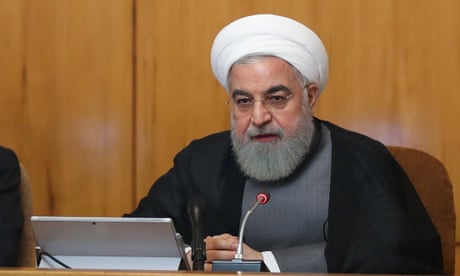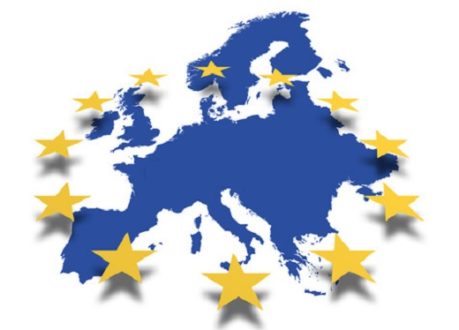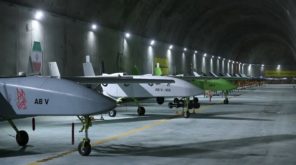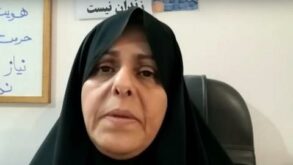Guardian – Britain and other international powers are set for crunch talks to persuade Iran to abandon its efforts to enrich uranium, after Tehran temporarily held back on its threat to breach the 2015 nuclear deal.
Iran had threatened to go over the 300kg limit for low-enriched uranium stockpiles on Thursday, but experts at the UN’s International Atomic Energy Agency said progress in increasing the stockpiles had been slower than expected and that the limit may not be reached until the weekend.
The temporary reprieve follows pressure from European leaders, especially the French president, Emmanuel Macron. Iran is now waiting on the outcome of talks at the G20 Summit in Japan this weekend, and more critically, negotiations with EU powers plus China and Russia in Vienna on Friday.
In Vienna, EU countries will set out plans to kickstart trade between Tehran and the bloc, one of Iran’s preconditions for sticking with the nuclear deal.

EU makes last-ditch effort to keep Iran from leaving nuclear deal
Iran was said to be adding to its stockpiles at a rate of 1kg a day and could have sped up the process if it had wished to do so. There was only passing mention of the delay in breaching the stockpile limit in the official Iranian press.
European diplomats said Iran in recent days had acknowledged that breaching the limit was unwise before Macron had attempted to persuade Donald Trump to de-escalate the situation by lifting some sanctions.
The EU powers are expected to unveil a plan to set up a multimillion-euro credit line to kickstart a trading mechanism known as Instex, designed to help EU businesses trade with Iran while avoiding US Treasury sanctions.
It is not known if the announcement of the relatively modest credit line will be enough to assuage Iran, which has been impatient regarding what it considers to be Europe’s failure to meet its commitments under the deal, known as the joint comprehensive plan of action (JCPOA).
The EU has said it has been engaged in laborious legal work to set up Instex and that the framework is in place, but it is not yet able to identify companies that definitely wish to use the mechanism. The key is for the EU to be able to announce some transactions before the next and more important Iranian deadline to break other parts of the nuclear deal, set for 7 July.Q&A
What is Iran’s nuclear enrichment cap?
The expected size of the credit line may disappoint Iran, but European officials say technical meetings about Instex’s progress were held last week in Tehran in a serious and good-natured atmosphere.
The EU is lobbying hard to persuade Washington not to see any transactions completed under Instex as a target for US Treasury sanctions, pointing out that all the trade is in humanitarian goods, including food. Such goods are supposed to be exempt from the sanctions.
The EU countries have said they cannot tolerate a “less for less” arrangement under which both Iran and the EU would reduce their commitments to the deal. The JCPOA is not a treaty or a legally enforceable document.
Calls for Iran not to break from the deal despite the heavy US economic sanctions were made repeatedly by diplomats, including from Russia, at a meeting of the UN security council on Wednesday.
Macron has called for “little gestures” to help defuse the crisis.
“Tensions are growing and for me the first element is that there is no exit from the framework. The second thing, and I will discuss it with the president [Trump] tomorrow, is to do everything to avoid a military escalation,” he said. “I had a conversation with President [Hassan] Rouhani [of Iran] a couple of days ago and I indicated that any exit from the accord would be an error and any signals in that direction would be an error.”
The US special envoy on Iran, Brian Hook, one of the leading architects of the sanctions regime throttling the Iranian economy, met European counterparts in Paris on Thursday. Hook insisted the US policy of maximum economic pressure was working. He will meet maritime officials in London on Friday to discuss stepping up security for oil tankers travelling through the Gulf after two separate attacks on vessels.Q&A
What is the Iran nuclear deal?
Show
The crisis took on a military dimension in the past month, with Washington and London blaming Tehran for the attacks on ships in the Gulf, and Iran shooting down a US drone. Iran denies blame for the ship attacks and says the drone was in its airspace when it was struck, an assessment with which Russia concurs.
On Thursday, Iran’s foreign minister, Javad Zarif, issued a warning to Trump that any belief he had that he could stage a “short war” with Iran was an illusion, adding that misconceptions could lead to military conflict.
He tweeted: “Sanctions aren’t alternative to war; they ARE war,” adding: “‘Obliteration’=genocide=war crime. ‘Short war’ with Iran is an illusion. Whoever begins war will not be the one ending it. Negotiations and threats are mutually exclusive.”
The US is due to announce sanctions against Zarif this week in a move that will be seen in Europe as undermining diplomacy.
 Shabtabnews In this dark night, I have lost my way – Arise from a corner, oh you the star of guidance.
Shabtabnews In this dark night, I have lost my way – Arise from a corner, oh you the star of guidance.



